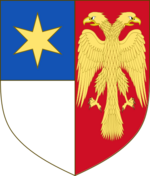Esau de' Buondelmonti facts for kids
Quick facts for kids Esau de' Buondelmonti |
|
|---|---|
| Despot | |

Arms of Esau de' Buondelmonti as Despot of Ioannina
|
|
| Ruler of Epirus | |
| Reign | 1385–1411 |
| Predecessor | Maria Angelina |
| Successor | Giorgio de' Buondelmonti |
| Died | 6 February 1411 |
| Spouse | Maria Angelina Doukaina Palaiologina Irene Spata Jevdokija Balšić |
| Issue | Giorgio de' Buondelmonti |
| House | Buondelmonti |
| Father | Manente Buondelmonti |
| Mother | Lapa Acciaiuoli |
| Religion | Roman Catholicism |
Esau de' Buondelmonti (Greek: Ησαύ Μπουοντελμόντ) was an important ruler in a region called Epirus, located in modern-day Greece. He governed the city of Ioannina and its surrounding areas from 1385 until he passed away in 1411. During his rule, he held the special Byzantine title of Despot, which meant he was a powerful leader.
Contents
The Life of Esau de' Buondelmonti
Becoming a Ruler
Esau was born into a noble family from Florence, a famous city in Italy. His father was Manente Buondelmonti, and his mother was Lapa Acciaiuoli. Lapa's brother, Niccolò Acciaiuoli, was a very successful person in Greece. Esau wanted to find similar success.
In 1379, Esau was captured during a battle against Thomas Preljubović, who was the ruler of Epirus at the time. After being held captive for several years, Esau's luck changed. In February 1385, he married Thomas's widow, Maria Angelina Doukaina Palaiologina. This marriage allowed Esau to become the new ruler of Ioannina.
Leading Ioannina
When Esau took power, he made many changes to improve things. Thomas, the previous ruler, had been very unpopular. Esau reversed many of Thomas's harsh rules. He invited back nobles who had been forced to leave. He also brought back Matthew, the bishop of Ioannina, who had been exiled.
Esau wanted to bring peace to his region. He tried to make agreements with the local Albanian groups. He also sought good relations with the Byzantine Empire, a powerful empire in the east. In 1386, a group from the Byzantine Empire visited Ioannina. They officially gave Esau the title of despot. Even though Esau ruled independently, this recognition from the Byzantines made his position stronger and more respected.
Dealing with Neighbors
Despite his efforts, it was hard for Esau to keep peace with all the Albanian groups. In 1385, Gjin Bua Shpata, another powerful Albanian leader, tried to attack Ioannina. However, Esau had prepared the city's defenses so well that Shpata had to retreat.
To protect his city, Esau had to ask for help from the Ottoman Empire, a growing power. In 1386, he traveled to meet Sultan Murad I to show his respect and ask for support. This alliance brought a period of peace to Epirus. But after the Battle of Kosovo in 1389, where Sultan Murad died, fighting started again. Ioannina was once more in danger, but Esau again got help from the Ottomans.
Later Years and Family
Esau spent about 14 months (1399–1400) at the Ottoman court under Sultan Bayezid I. When he returned to Ioannina, he had Ottoman support. He quickly defeated the Albanian groups that were causing trouble. This brought four more years of peace, with only a small conflict with Venice over a port.
In December 1394, Esau's first wife, Maria, passed away. This led to new conflicts with Gjin Bua Shpata. But they solved their problems through talks. In January 1396, Esau married Irene, who was Shpata's daughter. This marriage was part of their peace agreement.
However, peace did not last forever. Esau became very confident in his power and no longer needed Ottoman help. He even fought against the Ottomans and won.
In 1399, Esau, with the help of some Albanian groups, attacked Gjon Zenebishi, who was his wife's brother-in-law. This time, Esau was defeated and captured. Zenebishi took over much of Esau's land. Other powerful leaders in the area wanted Esau to be free. They asked Venice to help. Esau returned to Ioannina in 1400. He ruled peacefully until his death on February 6, 1411.
Family
Esau did not have children with his first wife, Maria Angelina Doukaina Palaiologina, or his second wife, Irene Shpata. With his third wife, Jevdokija Balšić, he had three children, including:
- Giorgio de' Buondelmonti, who briefly became the ruler of Ioannina after Esau. However, the local nobles soon removed him and gave the city to Carlo I Tocco.
 | John T. Biggers |
 | Thomas Blackshear |
 | Mark Bradford |
 | Beverly Buchanan |

